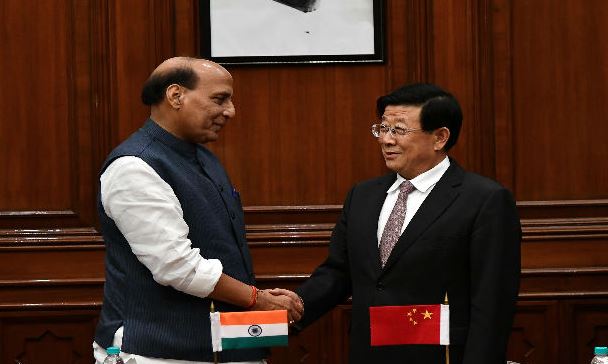India and China have signed an all important bilateral security agreement for cooperation in counter-terrorism and disaster management in an effort to boost ties between the two fast growing countries from Asia. The signing of the bilateral agreement took place between the Indian delegation led by Home Minister Rajnath Singh and the Chinese delegation led by Zhao Kezai who is the Minister of Public Security for China. The meeting between Rajnath Singh and Zhao Kezai had taken place on Monday and it included deliberations on internal security. India took a bold stance in the meeting by adding Minister of State for Home Affairs, Kiren Rijiju to the delegation which was supposed to meet with their Chinese counterparts. China had already objected to the addition of Kiren Rijiju’s name to the Indian delegation because of his links with Arunachal Pradesh. Parts of Arunachal Pradesh are claimed by China as their own, the Chinese authorities therefore had problems with Kiren Rijiju being a part of the Indian delegation as he hails from Arunachal Pradesh.
In the meeting held on Monday the two sides discussed issues related to security of the two countries. While India had raised the issue of Jaish-e-Mohammad chief Masood Azhar and China’s support to Pakistan over many issues, the Chinese had raised the issue of terror groups in North-East India and of security and safety in its Xinjiang province. The two delegations discussed bilateral counter-terrorism cooperation and also welcomed the arrangement as it will boost and strengthen cooperation and discussions in the future. The agreements will help the two countries in countering problems such as the illegal drug trade, organized crimes and other issues.
India too had reportedly dropped the name of Kiren Rijiju from the list of the members which were supposed to be a part of the delegation upon insistence from China. However, it later on chose to defy the whims of the Chinese delegation by asking Rijiju to be a part of the delegation which were engaged in holding talks. Kiren Rijiju confirmed his attendance at the meeting with a simple straightforward statement by saying, “Yes, I was part of the Indian delegation.” The home ministry spokesperson too confirmed Rijiju’s presence at the delegation but stated that he was not aware of any protests from the Chinese side owing to Rijiju’s being a part of the Indian delegation. China considers Arunachal Pradesh to be a “disputed” territory and therefore does not issue regular visas to people hailing from the state which shares its borders with China. China issues special staple visas to the people hailing from Arunachal Pradesh which India strongly protests against.
China’s biased behaviour with Rijiju also stems from the fact that it was the Minister of State for Home Affairs himself who had accompanied the Dalai Lama to Tawang in Arunachal Pradesh last year in 2017. The Dragon had been angry over this move by the Indian Minister which it had seen as an act which caused “serious damage” to the bilateral ties between the two countries.
India’s move is a defiance of the Chinese and sends a clear message that India is not ready to back down, a message similar to the one displayed by the government in the month long Doklam standoff. The move to send Kiren Rijiju is almost at par with the stance taken by the central government in the Doklam standoff, a very bold move which is meant to show China that India is not ready to play second fiddle to the Dragon anymore.
